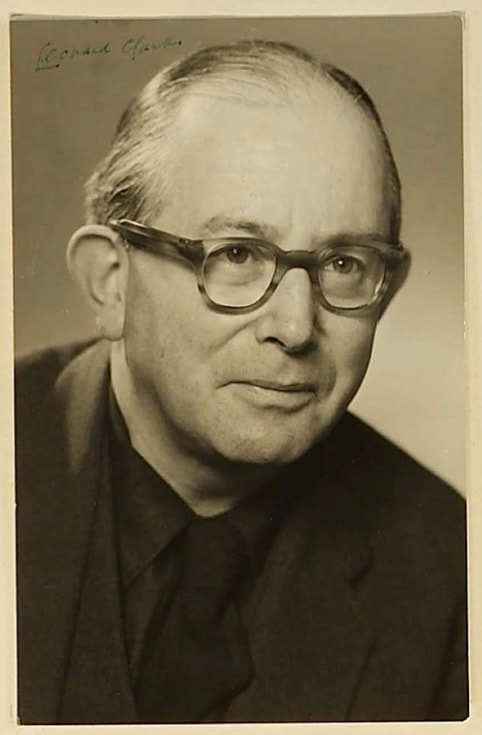lEONARD cLARK1905 - 1981
Poet, literary editor, and educationalist, Leonard Clark was awarded an OBE and counted fellow poet Sir John Betjeman amongst his many friends. He was a prolific writer, producing hundreds of poems during his life time, with many written specially for children. His poetry often reflected his love of nature, much of it describing the woods, fields and village life of his childhood and adolescence in the Forest. He also wrote biography and auto biography, as well as children's stories. Working as a schools inspector he also advised on education and edited many collections of poetry for children. A plaque marks his final resting place in Stephen's Church, Cinderford - back once again in his much loved Forest of Dean. |
LIFE & CAREERLeonard Clark was born in 1905 on Guernsey in the Channel Islands. His birth-mother was a governess in London. In a Britain unsympathetic to women who had children outside of marriage, she had gone away to have her child, far from anyone she knew. Leonard, a baby only a few months old, was sent to be fostered by a widow, Mrs Sarah Annie George of Belle Vue Road, Cinderford.
In his book Green Wood he describes his arrival at Newnham-on-Severn station, and being met by the sound of a brass band. Known as the ‘adopted son’ of Cinderford, reflecting his origins outside the Forest, his illegitimacy and fostering always troubled him, and he never felt as though he truly belonged anywhere. The Forest, however, became his great passion and inspiration. He grew up in a loving family and came to think of Mrs George as his real mother in everything but name. Living also with her three older sons - Allan, George and Frederick - he attended St Stephen’s Church. Enjoying music and reading, he was a pupil at Bilson Primary School, then Double View School where his talent shone being awarded a scholarship to Monmouth School. Lack of finance restricted his further education so he became a pupil teacher offering a route into the teaching profession. From his earliest days he was known to his family and friends as ‘Bob’. In his last year at school Leonard met Will Harvey, the Forest poet who took him under his wing. Will helped him write and publish his first volume of poems in 1923, and Leonard frequently contributed poems to The Citizen and The Dean Forest Mercury newspapers. At the same time his teaching career blossomed and at 25 he moved to London to teach at a school in Camberwell. He became engaged to a Gloucester librarian and school teacher, Florence Tobias, and they returned to Cinderford to get married in St Stephen’s Church in 1933 - Will Harvey was best man. They moved to Plymouth where Leonard was made Assistant Inspector of schools. In 1939 they lost a new-born son, Robin. The couple divorced during the Second World War. As well as his own work, he was Editor of the Longmans Poetry Library series, and Consultant Editor of Chatto & Windus Poetry Books for the Young in London, and Thornhill Press in Gloucester. He wrote for both adults and children, producing more than fifty books of poetry and prose and editing about twenty others. Early in his career he wrote a biography of Alfred Williams, the working class self-taught poet and railway worker from Swindon. He was interested in the works of other poets and edited collections of poetry by Andrew Young, Walter de la Mare, and Ivor Gurney. He had become highly regarded by many of his contemporaries from the world of literature, and feted with numerous awards and accolades, including:
His later volumes of poetry for adults, such as The Way It Was (1980) represent some of his finest work and reflect on his life and particularly his time in the Forest. In 1980, on his 75th birthday he visited the Forest and featured in local newspapers, where Dennis Potter, Winifred Foley and other Forest authors acknowledged his influence. He used the opportunity to visit childhood places with his son and make specific wishes about his funeral arrangements. He died the following year and his son returned to the Forest with his ashes. One half were scattered from Symonds Yat viewpoint and the other interred in St Stephen’s Church. |
POETRYHis early work was heavily influenced by Will (F.W.) Harvey, and he even included a dialect poem in his first volume of poems. He clearly looked up to him and modelled his work and outlook on the character of his tutor.
Clark’s poems were written in the Georgian tradition and very structured. This made his work particularly accessible to children for whom he wrote poems around a single theme; 'poems that have the young in mind, according to their stage of experience, as well as those poems that have been composed specifically for them because they are young.’ His early poetry for adults continued a theme inherited from the Gloucestershire poets, Harvey and Gurney, an appreciation of beauty in the natural world. He built much of this work around places and people he knew in, and around, Cinderford. Although he incorporated Devon and Yorkshire in his poems, he returned to his favourite Forest places such as Abbots and Chestnut Woods for his best and later work.
Some of his later work touched the feelings evoked by events in his life and had a particular resonance with those who shared his experiences. His poem Stillborn is written in the voice of a mother who wonders if ‘you rejected us?’ and is still widely used by groups supporting people who have experienced a still birth.
AUTOBIOGRAPHYThe biographical works reflecting his time growing up in the Forest, paint a picture of a bygone era with trips to Gloucester (the nearest city) taken by horse and cart. These books contain rich and warm portraits of people and places. They can be seen as a slightly sentimentalised and romantic version of Forest life but are none the less applauded as historical sources. His use of chapters to structure comedic stories were later picked up by Winifred Foley and others writing about their own experiences and Forest humour.
|
LISTEN...Recordings by kind permission of The British Library, British Council and Leonard Clark estate.
booksA selection of the many books written & edited by Leonard Clark:
Autobiographical A Fool in the Forest, (1965) Green Wood: A Gloucestershire Childhood, (1962) Grateful Caliban, (1967) An Inspector Remembers, (1976) Poetry The Mirror English Morning and Other Poems, (1953) The Broad Atlantic, (1974) The Hearing Heart, (1974) The Way It Was, (1980) An Intimate Landscape, (1981) As I looked Over Jordan, (1984) Edited collections of others’ poetry Andrew Young Walter de la Mare Ivor Gurney Stories for Children Robert Andrew Tells a Story, (1965) Robert Andrew by the Sea, (1965) Robert Andrew in the Country, (1966) Mr. Pettigrew's Harvest Festival, (1974) Mr. Pettigrew's Train, (1975) Mr. Pettigrew and the Bellringers, (1976) Edited anthologies for children Drums and Trumpets: Poetry for the Youngest, (1962) Common Ground: An Anthology for the Young, (1964) Flutes and Cymbals: Poetry for the Young, (1968) The Magic Kingdom: An Anthology of Verse for Seniors, (1937) The Open Door: An Anthology of Verse for Juniors, (1937) All Along, Down Along: A Book of Stories in Verse, (1971). Other Who Killed the Bears, (1964) |
For requests to use material written by Leonard Clark, contact The Literary Executor of Leonard Clark:
[email protected]
[email protected]
COMMENTS
Have you read one of Leonard Clark's books or poems? Tell us about it here...or via our contact page and we'll post it here...



